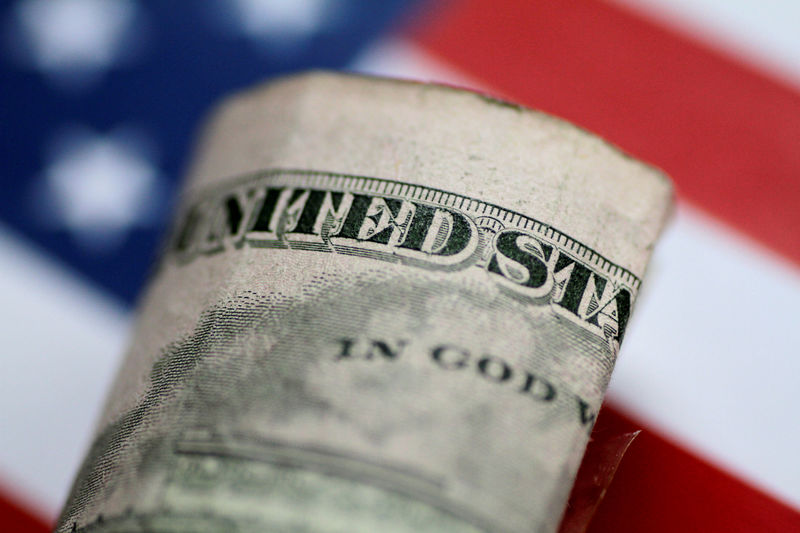Hedge funds cut NFLX, keep big bets on MSFT, AMZN, add NVDA
* Graphic: World FX rates in 2020 https://tmsnrt.rs/2RBWI5E
* ECB holds emergency meeting
* Coronavirus grips financial markets
* Some investors hoarding dollars
By Stanley White
TOKYO, March 19 (Reuters) - The dollar resumed its
relentless climb against major currencies on Thursday as wild
financial market volatility and worries over tightening
liquidity triggered by the coronavirus pandemic sparked an
investor flight into cash.
Sterling teetered near the lowest since at least 1985
against the greenback. The Australian dollar skidded to a
17-year low, while the New Zealand dollar crashed to an 11-year
low as investors dumped riskier assets.
The euro briefly rose against the dollar and the pound after
the European Central Bank announced a 750 billion euro ($817
billion) asset-purchase programme in response to the coronavirus
outbreak, but even this effort was overwhelmed by a stampede
into the dollar.
Investors are selling what they can to keep their money in
dollars due to the unprecedented amount of uncertainty caused by
the epidemic, which threatens to paralyse large swathes of the
global economy.
"This is similar to what happened during the global
financial crisis in that investors are even selling what are
normally considered safe-haven assets," said Junichi Ishikawa,
senior foreign exchange strategist at IG Securities in Tokyo.
"The logic is the biggest hedge against risk is holding your
money in cash, so the dollar is being bought. Investor
uncertainty is about as high as it can get."
The dollar rose 0.8% against the pound GBP=D3 to $1.1528,
approaching the strongest since at least 1985, as the rush into
dollars left no currency unscathed.
The greenback jumped 3% to an 11-year high versus the New
Zealand dollar NZD=D3 and rose more than 3% against the
Australian dollar AUD=D3 to a 17-year high.
The Reserve Bank of Australia cut interest rates for a
second time this month on Thursday after an out-of-schedule
policy meeting and made a foray into quantitative easing for the
first time. The U.S. dollar has been climbing against most other
currencies as a shortage of the currency pushed up swap rates.
Major central banks have taken steps this week to increase
dollar liquidity, but this has done little to slow the dollar's
gains.
Against the yen JPY=EBS , the greenback rose 0.65% to
108.76.
In many cases investors are unloading Treasuries and other
government bonds as well as gold in order to keep their money in
dollars. This has confounded many analysts because investors
normally buy government debt and precious metals during times of
uncertainty.
The euro EUR=EBS initially rose after the ECB announced a
new asset purchase programme, but the common currency erased
gains to trade little changed at $1.0924.
The dollar rose 0.5% to 11.3860 Norwegian crown NOK=EBS ,
approaching a record high reached Wednesday. Norway's currency
also slid to a record low versus the euro EURNOK= .
The ECB's purchase scheme, which was announced at an
emergency meeting late on Wednesday, came less than a week after
policymakers launched fresh stimulus measures.
Major central banks this week have announced emergency
interest rate cuts, asset purchases, and dollar liquidity
provisions in an attempt to calm financial markets, but the
effect has been less than many policymakers desired.
The dollar funding crisis and consequent rise in the dollar
in spot markets =USD has caused deep falls in emerging market
currencies. The dollar is up 27% so far this year against
Brazil's real BRL= and around 10% each against the Korean won
KRW= and Indonesian rupiah IDR= .
Global markets have been upended in recent weeks as the
coronavirus spread from central China and governments responded
with increasingly strict restrictions on travel and daily life,
disrupting businesses and prompting consumers to stay at home
and rein in spending. The virus has now been reported in more
than 100 countries and has claimed more than 8,000 lives.
The heightened uncertainty has triggered emergency lockdowns
and injections of cash unseen since World War Two, causing
investors to abandon traditional trading strategies in favour of
selling what they can to keep their money in dollars.
($1 = 0.9182 euros)
<^^^^^^^^^^^^^^^^^^^^^^^^^^^^^^^^^^^^^^^^^^^^^^^^^^^^^^^^^^^
Emerging market currencies sink https://tmsnrt.rs/39YjsWG
^^^^^^^^^^^^^^^^^^^^^^^^^^^^^^^^^^^^^^^^^^^^^^^^^^^^^^^^^^^>
